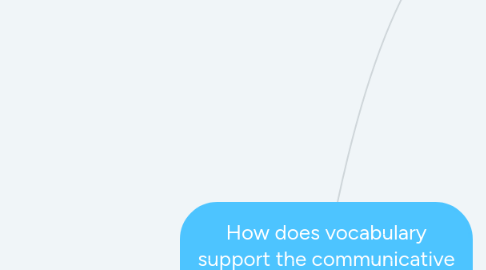
1. Linguistic
1.1. Vocabulary supports the linguistic competence from the grammatical point of view since it allows you to make use of a command over the grammar rules, giving you a good formation of sentences, as well as the rules that determine the use of the language in the production of appropriate sentences in the discursive context also allows you from the syntax to give an order to the construction of words or phrases, giving them a meaning.
1.2. Vocabulary supports linguistic competence from semantics since it allows you to infer meanings and use the lexicon in a pertinent way according to the context, allowing you to establish relationships according to the development of a theme.
1.3. Vocabulary supports the linguistic competences from the phonological subcompetence, since vocabulary domain allows the speaker the categorical organization of the speech sounds in the languages; allows you to find meaning and be used to convey meaning.
1.4. Vocabulary supports linguistic skills from orthopedic competence through the correct use of vocabulary, which gives the speaker the ability to use the correct pronunciation of written forms.
2. Sociolinguistic
2.1. Linguistic markers of social relations
2.1.1. In this regard, vocabulary plays a fundamental role since if one has knowledge of linguistic markers, the person communicating will know that the message is being understood correctly. In addition, speaking turns will be respected allowing a fluidity in the conversation.
2.2. Politeness conventions
2.2.1. It is necessary to know words that allow us to be courteous to other people, such behavior includes, among many others, the following acts: - to greet - to say thank you - to apologize - to say goodbye Without knowledge about this, we will not know how to address both known and unknown people, and we can be impolite without knowing it.
2.3. Expressions of folk wisdom
2.3.1. When we are in a different place, for example a region, country or continent where there is a different culture, it is important to know about the expressions of popular wisdom of that place, what we achieve through vocabulary to be able to value those specific aspects of each culture and interact in an appropriate and respectful manner.
2.4. Register differences
2.4.1. It is essential to have lexical knowledge about formal and informal registers to know how to differentiate them and be aware of how to communicate according to the communicative context. Some examples of formal and informal records are as follows:
2.4.1.1. Formal
2.4.1.1.1. When did you arrive in Manchester?
2.4.1.1.2. Please, continue with what you are doing
2.4.1.1.3. Did you achieve Good results?
2.4.1.2. Informal
2.4.1.2.1. When did you get to Manchester?
2.4.1.2.2. Go on with what you are at
2.4.1.2.3. Did you get Good results? Did you have Good results?
2.5. Dialect and accent
2.5.1. Through vocabulary we can recognize some aspects such as social class, regional origin, nationality, ethnic group or professional group, among others, of the people with whom we interact.
3. Pragmatic
3.1. Discursive competence
3.1.1. Vocabulary allows developing the ability to function effectively and appropriately, combining grammatical forms and meaning to achieve an organized text (oral or written), in different communication situations.
3.2. Functional competence
3.2.1. Through the resources of language, such as vocabulary, the speaker will have the ability to be able to keep the flow of communication and be clear about what he wants to communicate.
